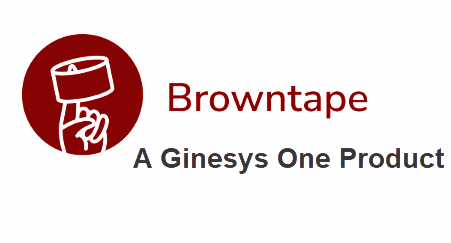Best eCommerce Software
The best eCommerce software solutions are OsCommerce, Drupal Commerce, BigCommerce, Shopify, and Magento. Such eCommerce platforms help to create an online presence and manage your online business.



No Cost Personal Advisor
List of 20 Best Ecommerce Software
#1 Cloud ERP for Fast-Growing Businesses
NetSuite, #1 cloud ERP, is an all-in-one cloud business management solution that helps more than 29,000 organizations operate more effectively by automating core processes and providing real-time visibility into operational and financial performance. Read Oracle NetSuite ERP Reviews
Explore various Oracle NetSuite ERP features, compare the pricing plans, and unlock the potential of seamless operations by selecting the right software for your business.
- Order entry (OE)
- Payment Gateway Integration
- Lead Management
- Vendor Management
- Manage Customers and Suppliers
- Mobile Support
- Multiuser Login & Role-based access control
- Sales Quotes
Oracle NetSuite ERP Caters to
- StartUps
- SMBs
- Agencies
- Enterprises
Contenders | 2024
Your stunning website is just a few clicks away.
Create your own professional website and manage your business online. Discover 100s of powerful business Apps to manage your business online. Get real creative freedom from start to finish. Read Wix Reviews
Explore various Wix features, compare the pricing plans, and unlock the potential of seamless operations by selecting the right software for your business.
Features
View all Wix Features- Web Analytics
- Animations
- Customizable Templates
- Scroll Effects
- Custom Code Integration
- Blogging
- Inventory Management
- Compatibility for Mobile and Tablet
Pricing
Wix Caters to
- StartUps
- SMBs
- Agencies
- Enterprises
Category Champions | 2024
Best eCommerce Platform for Small Business
BigCommerce is the perfect eCommerce software for SMEs to launch their products online. Ecommerce solutions is one of those online store builders that has the capability to fuel your business free up your time. Right from building a robust eCommerce tools to scaling without complexity, BigCommerce has got your back. Read BigCommerce Reviews
Explore various BigCommerce features, compare the pricing plans, and unlock the potential of seamless operations by selecting the right software for your business.
Features
View all BigCommerce Features- Product configurator
- Templates
- Customer Support
- Email Marketing
- Secure Sockets Layer (SSL)
- Order Management
- Shopping Cart
- Facebook Store
Pricing
BigCommerce Caters to
- StartUps
- SMBs
- Agencies
- Enterprises
Software by Jungle Scout
Jungle Scout is a fully featured Ecommerce software designed to serve SMEs, Startup, Agencies, Enterprises. Jungle Scout provides end-to-end solutions designed for Web App. This Ecommerce software offers Dashboard, Customer Management, Affiliate Marketing, Compliance Management, Contact Management at one place. Learn more about Jungle Scout
Explore various Jungle Scout features, compare the pricing plans, and unlock the potential of seamless operations by selecting the right software for your business.
Features
View all Jungle Scout Features- Campaign Segmentation
- Approval Workflow
- Customer Management
- Contact Management
- Campaign Management
- Configuration Management
- Compliance Management
- Dashboard
Pricing
Jungle Scout Caters to
- StartUps
- SMBs
- Agencies
- Enterprises
Category Champions | 2024
eCommerce Software by Oracle NetSuite
SuiteCommerce is one of the best cloud eCommerce software that helps you create omnichannel experiences through various channels like in-store, web, and mobile. Backed by professional services, it has got everything that your business needs to succeed in this fierce competition. Read Oracle NetSuite ERP Reviews
Explore various Oracle NetSuite ERP features, compare the pricing plans, and unlock the potential of seamless operations by selecting the right software for your business.
- Manufacturing Inventory Management
- Historical Reporting
- Backup Log
- Reporting & statistics
- Profit & Loss Statement
- Filtered Search
- Software License Management
- Sales & Operations Planning
Oracle NetSuite ERP Caters to
- StartUps
- SMBs
- Agencies
- Enterprises
Contenders | 2024
Sell Everywhere
Browntape Ecommerce Software pulls in orders automatically from all online portals in one place where you can bulk print labels, ship and track orders. Orders and inventory sync seamlessly across online portals and offline stores. Read Browntape Reviews
Explore various Browntape features, compare the pricing plans, and unlock the potential of seamless operations by selecting the right software for your business.
Features
View all Browntape Features- Multi-channel
- Routing
- Barcoding / RFID
- Warehouse Shiping Management
- Scan Barcodes
- Billing & Invoicing
- Item Management
- Kitting
Pricing
DIY Software
$ 0
Per Order
Managed Ecommerce Services
$ 0
Contact Us for Customize Plan
OmniChannel
$ 0
Contact Us for Customize Plan
Browntape Caters to
- StartUps
- SMBs
- Agencies
- Enterprises
Emergents | 2024
Multi Vendor Shopping Cart Software
Uniware is eCommerce software that enables eCommerce merchants of all sizes to sell more. It is a fast-growing web-based, multi-channel order fulfilment software. It is one of the best eCommerce platform software for both B2C and B2B companies. Read Uniware Reviews
Explore various Uniware features, compare the pricing plans, and unlock the potential of seamless operations by selecting the right software for your business.
Features
View all Uniware Features- Inventory Management
- Order Management
- Payment Gateway Integration
- Orders Management
- Security
- Discounts & Coupons
- Vendor Management
- Order Status / Tracking and History
Uniware Caters to
- StartUps
- SMBs
- Agencies
- Enterprises
Contenders | 2024
Ecommerce Store Builder BY PrestaShop
Since its creation in 2007, PrestaShop has grown to be the leading eCommerce shopping cart platform on the market today. PrestaShop is an Open Source Shopping Cart Software that is currently used by more than 185,000 online stores worldwide. Read PrestaShop Reviews
Explore various PrestaShop features, compare the pricing plans, and unlock the potential of seamless operations by selecting the right software for your business.
Features
View all PrestaShop Features- Secure Sockets Layer (SSL)
- Product Database
- Security
- Shopping Cart
- Catalog Management
- Email Marketing / SMS Marketing
- Orders Management
- Storage & Number of Products
Pricing
Start
$ 29
Per Month
PrestaShop Caters to
- StartUps
- SMBs
- Agencies
- Enterprises
Contenders | 2024
eCommerce Website Solutions BY Cloudnix Software Labs Pvt. Ltd.
Shopnix eCommerce platform builds a full-fledged eCommerce store equipped with store manager, multiple secure payment gateways and shipping options in minutes. It has in-built SEO, automated email tools, marketing tools, and customer management. Read Shopnix Reviews
Explore various Shopnix features, compare the pricing plans, and unlock the potential of seamless operations by selecting the right software for your business.
Features
View all Shopnix Features- Mobile App
- Discounts & Coupons
- Facebook Store
- DIY Store
- Catalog Management
- Bulk Product Upload
- Hosting
- Mobile Friendly Store
Pricing
Quicky
$ 167
Per Year
Starter
$ 333
Per Year
Pro
$ 208
3 Month
Shopnix Caters to
- StartUps
- SMBs
- Agencies
- Enterprises
Category Champions | 2024
Most Advanced Ecommerce Platform
StoreHippo is a modern eCommerce web store solution that offers you everything that you may need for your online business. This eCommerce software provides full customization and is built using highly scalable technology. Read StoreHippo Reviews
Explore various StoreHippo features, compare the pricing plans, and unlock the potential of seamless operations by selecting the right software for your business.
Features
View all StoreHippo Features- Social Network Integration
- Hosting
- Storage & Number of Products
- Integration with marketplaces
- Product Database
- Plugin
- Design Template Gallery
- Customer Support
Pricing
Professional
$ 42
User/Month
Premium
$ 83
User/Month
Business
$ 139
User/Month
StoreHippo Caters to
- StartUps
- SMBs
- Agencies
- Enterprises
Emergents | 2024
eCommerce software For Your Business
Best eCommerce platform software for retail stores and online business.PrimaSeller manage Stock from Web and Mobile Point of Sale. With Marketplace Integration you can manage inventory, stock and orders on online store and shopping portals. Read Primaseller Reviews
Explore various Primaseller features, compare the pricing plans, and unlock the potential of seamless operations by selecting the right software for your business.
Features
View all Primaseller Features- POS invoicing
- Mobile App
- Catalog Management
- Order Status / Tracking and History
- Customer Support
- Product Database
- Integration with marketplaces
- Inventory Management
Pricing
Beginner
$ 14
User/ Month
Professional
$ 28
Per Month
Advanced
$ 69
Per Month
Primaseller Caters to
- StartUps
- SMBs
- Agencies
- Enterprises
Emergents | 2024
Software by CBO ERP Limited
CBO is a best, cost effective and flexible Pharma SFA for pharmaceutical companies. Software is capable of importing and exporting existing data from all the other billing and inventory software and can also be integrated with in TALLY. Read CBO Reviews
Explore various CBO features, compare the pricing plans, and unlock the potential of seamless operations by selecting the right software for your business.
Features
View all CBO Features- Billing & Invoicing
- Records Management
- Stock Management
- Sample & Gift Inventory
- Workflow Automation
- Inventory Management
- Online Reporting
- Document Management
CBO Caters to
- StartUps
- SMBs
- Agencies
- Enterprises
Emergents | 2024
Award-winning open source B2B eCommerce software
Improve your online services and business with the help of the cutting-edge online eCommerce platform software. The leading eCommerce business software come is power-packed with numerous integrated features like hosting and store customization, which will make it easy to manage your business on the online platform. Read OroCommerce Reviews
Explore various OroCommerce features, compare the pricing plans, and unlock the potential of seamless operations by selecting the right software for your business.
Features
View all OroCommerce Features- Email Marketing / SMS Marketing
- Orders Management
- Promotions Management
- Customer Account Profiles
- Catalog Management
- Multi-Store Management
- Shopping Cart
- Product configurator
OroCommerce Caters to
- StartUps
- SMBs
- Agencies
- Enterprises
Emergents | 2024
Ecommerce Online Shopping Software BY 3dCart
3dcart is one of the top ecommerce solutions. This web-based tool helps to build an easy online shipping and payment platform. It enables you to help increase ranking on search engine and promote items. Advanced design attracts users and generates more traffic on your platform. Read 3dcart Reviews
Explore various 3dcart features, compare the pricing plans, and unlock the potential of seamless operations by selecting the right software for your business.
Features
View all 3dcart Features- Catalog Management
- Returns Management
- Credit Card Processing
- Inventory Management
- Discount Management
- Abandoned Cart Saver
- Order Management
- Channel Management
Pricing
Basic
$ 29
Per Month
Plus
$ 79
Per Month
Pro
$ 229
Per Month
3dcart Caters to
- StartUps
- SMBs
- Agencies
- Enterprises
Category Champions | 2024
eCommerce Software by Shopify Inc.
Shopify is a Leading eCommerce Platform and popular among the small retailers and startups. Shopify themes, templates, apps & SEO features makes it easier to create online store quickly. Manage your customers, inventory, orders and billing from one platform. Read shopfiy reviews to learn why over more than 1,00,000+ business trust shopify ecommerce platform. Read Shopify Reviews
Explore various Shopify features, compare the pricing plans, and unlock the potential of seamless operations by selecting the right software for your business.
Features
View all Shopify Features- Offer & Offer Popup
- Security
- Storage & Number of Products
- Mobile App
- Orders Management
- POS invoicing
- Inventory Management
- Hosting
Pricing
Basic Shopify
$ 29
Per Month
Pro Shopify
$ 79
Per Month
Advanced Shopify
$ 229
Per Month
Shopify Caters to
- StartUps
- SMBs
- Agencies
- Enterprises
Contenders | 2024
Platform that empowers you to run your ecommerce businesss
We are focused on catering the unique requisites of an online store. The platform is Customisable, Reliable, Scalable, and Aggressive on Performance. All of this makes it easier to setup an ecommerce store and reach out to your target customers. Read CommerceUp Reviews
Explore various CommerceUp features, compare the pricing plans, and unlock the potential of seamless operations by selecting the right software for your business.
Features
View all CommerceUp Features- International Payment Acceptance
- Real Time Editing
- Product Recommendations
- eCommerce Store
- Product Ratings / Reviews
- Online payments
- Loyalty Program
- Discounts & Coupons
CommerceUp Caters to
- StartUps
- SMBs
- Agencies
- Enterprises
Emergents | 2024
Build Fast and Delightful Omnichannel Experiences
Capillary Anywhere Commerce+ is a mobile-first, omnichannel eCommerce platform software featuring PWA, AI-powered recommendations & robust OMS. Make every consumer interaction memorable by making it easy for your consumers to buy from you anywhere, anytime. Read Anywhere Commerce+ Reviews
Explore various Anywhere Commerce+ features, compare the pricing plans, and unlock the potential of seamless operations by selecting the right software for your business.
Features
View all Anywhere Commerce+ Features- Audience Segmentation
- Data Cleansing
- Discount Management
- Channel Attribution
- SEO and Online Marketing
- Website Management
- Orders Management
- Social Commerce
Anywhere Commerce+ Caters to
- StartUps
- SMBs
- Agencies
- Enterprises
Contenders | 2024
Best Ecommerce Solution in India
Vin eRetail WMS, a part of Gartner Magic Quadrant (2017-20) is powerful SaaS-based eCommerce platform software that enables brands, retailers, 3PLs, marketplaces, and this ecommerce tools distributors to streamline warehousing operations. Read Vin eRetail OMS and WMS Reviews
Explore various Vin eRetail OMS and WMS features, compare the pricing plans, and unlock the potential of seamless operations by selecting the right software for your business.
- 3PL Management
- Real Time Synchronization
- Billing Management
- Replenishment Management
- Retail POS
- Order tracking
- Catalog Management
- Return Management
Pricing
Vin eRetail
$ 0
Per Order
Vin eRetail OMS and WMS Caters to
- StartUps
- SMBs
- Agencies
- Enterprises
Emergents | 2024
Software by Zencommerce
Zencommerce is most reliable, user-friendly and instant online store. Assuring customized themes and designing, tech support, secure payment options and equipped with best managing tools it is trending these days. Frequent updating with new tools makes it effective to use. Learn more about Zencommerce
Explore various Zencommerce features, compare the pricing plans, and unlock the potential of seamless operations by selecting the right software for your business.
Features
View all Zencommerce Features- Order Management
- Customer Support
- Returns Management
- Shopping Cart
- Product Database
- Customer Account Profiles
- Mobile App
- POS invoicing
Pricing
Gold
$ 12
Per Month
Platinum
$ 25
Per Month
Zencommerce Caters to
- StartUps
- SMBs
- Agencies
- Enterprises
Emergents | 2024
Software by SITE123
SITE123 is here to change everything you know about online website builders. It is a comprehensive solution for private and corporate users, offering tools that let you build a website without prior experience in design or coding. Also, we offer 24/7 live chat support. Learn more about SITE123
Explore various SITE123 features, compare the pricing plans, and unlock the potential of seamless operations by selecting the right software for your business.
Features
View all SITE123 Features- SEO Management
- SEO Wizard
- Pre-built Templates
- Online Store Builder
- Abandoned Cart Tool
- Online Booking Tools
- Multi-Store Management
- Web Forms
SITE123 Caters to
- StartUps
- SMBs
- Agencies
- Enterprises
Until 30th Apr 2024

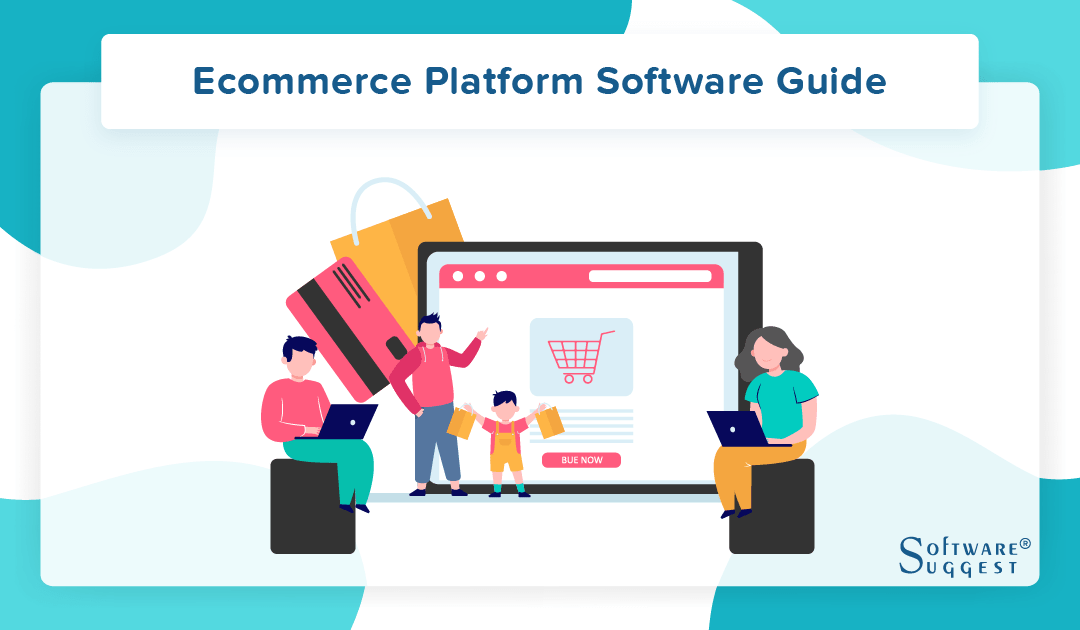
What is eCommerce Software?
eCommerce software is a platform for setting up and running an online retail store. It offers many features, including self-service portals, website designs, product listings, online payments, sales reports, inventory management, and CRM.
eCommerce software helps merchants to set up an online business in easy steps using eCommerce solutions. There are particular types of eCommerce Software Applications designed to build, deploy, and manage an online shopping website where merchandise can be displayed, sold, and bought.
Many free and open-source eCommerce software solutions help you build fully–integrated online eCommerce software without investing a large fortune. Often, these eCommerce software platforms come with in-built modules and widgets to get embedded into your existing interface to create multi-vendor eCommerce platforms. Both on-premise and hosted solutions are available to meet the varied requirements of customers using different eCommerce website solutions. While on-premise eCommerce solution will give you more control and flexibility over content management, hosted eCommerce solutions will lower installation and management expenses.
As the demand for integrated online store software has risen, many vendors are offering easily customizable eCommerce solutions tools to meet a business's varied and intrinsic requirements to build an eCommerce website.
What are the Top e-Commerce Software Vendors by Company Size?
|
Enterprise
|
Medium
|
Small Business
|
|---|---|---|
| SquareSpace | Shopify | |
| Open Cart | Volusion | |
|
Magento Commerce
|
Zen Cart | Magento Open-Source |
With eCommerce applications spanning their reach across verticals, it is estimated that the eCommerce application market size will reach $111 billion by 2024. Top-notch eCommerce software solutions and applications are taking the market to the next level with advanced integration capabilities and personalization.
Here, we will take a look at some of the top eCommerce software vendors in terms of their market share and company size. Moreover, we also have a few great picks based on the size of your business.
eCommerce Platform Comparison for Enterprise-Grade Businesses
As each vendor has a different story, comparing enterprise eCommerce software platforms seems challenging. However, if you have implemented an ERP system in your business, you must look for an eCommerce platform that supports ERP integration. Because an enterprise eCommerce without ERP integration will turn out to be more costly.
Some of the leading enterprise eCommerce software providers include Shopify Plus, Magento, BigCommerce, and more.
 |
 |
 |
|
|---|---|---|---|
|
Shopify Plus
|
Big Commerce
|
Magento Commerce
|
|
| Free Trial | 90 days | 15 days | 30 days |
| Pricing (Basic Plans) | $2000/m | $29.95/m | $1988.00/m |
| Free Custom Domain | |||
| Support | Dedicated | Community | Community |
| Products | Unlimited | Unlimited | Unlimited |
| Built-in CMS | |||
| Built-in Marketing Tools | |||
| Multi-channel Integration | |||
| Inventory |
eCommerce Platform Comparison for Medium-sized Businesses
With small businesses transforming to medium-sized businesses, they seek solutions that power their business and make it ready for long-term growth. When it comes to eCommerce software platforms, you will find them all similar in many regards. But those for medium-sized businesses differ in pricing, setup, features, and installation. So, the following eCommerce platform comparison will help you make the search easier.
Some of the great software for ecommerce businesses include SquareSpace, Open Cart, and many more.
 |
 |
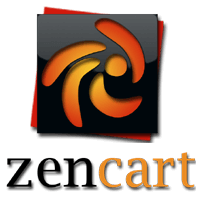 |
|
|---|---|---|---|
|
SquareSpace
|
OpenCart
|
Zen Cart
|
|
| Free Trial | 14 days | ||
| Pricing (Basic Plans) | $12/m | Open-Source | Open-Source |
| Free Custom Domain | |||
| Support | Community | Community | Community |
| Products | Unlimited | Unlimited | Unlimited |
| Built-in CMS | |||
| Built-in Marketing Tools | |||
| Multi-channel Integration | |||
| Inventory |
eCommerce Platform Comparison for Small Businesses
If you’re looking to set up an amazing online store without draining your bank account, many eCommerce software solutions are tailored to small business needs. Right from aggregating salient features for online visitors to make your online storefront more creative, here’s a definitive eCommerce platform comparison for small businesses.
However, some of the leading software used in e-commerce include Shopify, Wix, Volusion, and more.
 |
 |
 |
|
|---|---|---|---|
|
Shopify
|
Volusion
|
Magento Open-Source
|
|
| Free Trial | 90 days | 14 days | |
| Pricing (Basic Plans) | $29/m | $29/m | Open-Source |
| Free Custom Domain | |||
| Support | Dedicated | Dedicated | Community |
| Products | Unlimited | Unlimited | Unlimited |
| Built-in CMS | |||
| Built-in Marketing Tools | |||
| Multi-channel Integration | |||
| Inventory |
|
What are the Top eCommerce Software Used by Industries?
If you are a retailer, seller, or merchant seeking to gain a competitive edge over the market, deploying eCommerce software can help you. Estimates say that 75% of eCommerce software users belong to the retail industry. Food services, hospitality, and business services make the rest of the contributions.

How can eCommerce Software Help Your Business?
Launching your business online can help you gain instant visibility with a deluge of prospective customers. The best eCommerce software helps you to understand how to create an eCommerce website. If you, too, are considering migrating your existing business to online eCommerce solutions, here is a list of advantages that embracing online store software would offer you.
-
eCommerce solutions software, especially for small and medium-sized businesses, offers a level playing platform with top, established brands. It allows small artisans and entrepreneurs to showcase their products to a larger customer base and gain instant visibility across the online platform.
-
It is easier to promote your business online. It helps your business gain online visibility across top eCommerce platforms and reaches out to more customers. You can instantly create buzz on big-day sales, discounts, and events.
-
Your customer can reach you directly. Moreover, you can keep your shop open 24x7. Through online transactions, deals are closed instantly. So, no worries regarding receivables. You can also offer comfortable payment options to your customers, which will make them more interested in buying products from your website.
If you have an in-house IT team, you can build an online store platform from scratch, or else, there are now plenty of ready-to-use, off-the-shelf applications available that can be customized according to your eCommerce business requirements. Zepo, Shopify, and BuildaBazar are a few such retail eCommerce software platform solutions that allow you to build personal online stores in easy steps.
What are the Top Features of eCommerce Software?
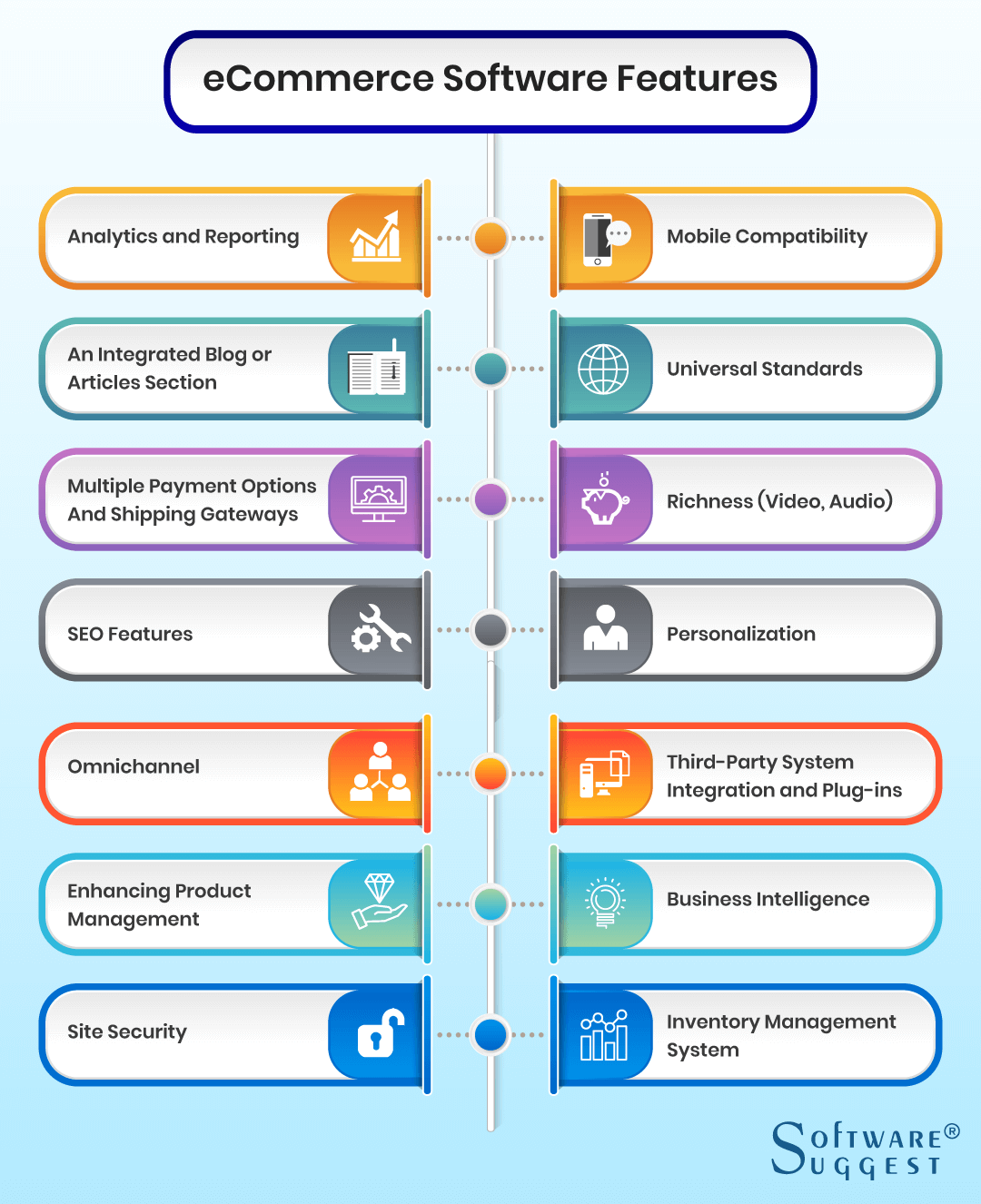
-
Analytics and Reporting
Analytics and reporting in eCommerce software platforms help you identify trends and buy patterns of your customers. It further provides you with insights and stats on keywords, demographics, and clickstreams to tell you what is working or not in your eCommerce business. You can also track user interest, and shipping, and market your products better from the customer data to improve revenue streams. This feature from eCommerce management software eventually helps to know about the use of interest in the details of your customers.
-
An Integrated Blog or Articles Section
eCommerce software can help you integrate a blog section on your site. You can drive more traffic to your website through blogging by generating different product-centric content. The eCommerce software allows you to have the edge over your competitors through a blog section as you can increase the visibility of your products through content generated on the blogs. It also allows you to manage a comment section in your blog to help establish credibility and increase customer engagement.
-
Multiple Payment Options And Shipping Gateways
One of the best features of eCommerce software is that it allows you to offer multiple payment gateways and shipping options to your customers. Payment gateways process and authorize payments made from debit and credit cards. Hence, providing purchase options to customers from multiple credit cards, bank transfers, online net banking, etc., can ease customer transactions for sellers and customers. Similarly, multiple carriers of shipping can be directly integrated into your website through eCommerce software to help deliver the products to your customers faster.
-
SEO Features
Sharing engaging content is one of the crucial challenges in attracting customers to your eCommerce website. Sharing content on different media platforms should help you lead the customers ultimately to your website. However, through eCommerce software, you can get better results in SERPs (Search Engine Results Pages) by adding fresh and unique content directly to your website. eCommerce software enables optimum SEO and guides you to write better meta descriptions, and product descriptions, add relevant keywords and also write better blog posts. This will ultimately improve your site's quality and increase keyword density to avoid plagiarism.
-
Omnichannel
eCommerce software should offer a combination of multiple channels to provide more freedom for customers to make better buying decisions. Customers will have more options for research by toggling from blogs, posts, testimonials, social media links, etc., and increase their point of sales purchases. Website owners can offer more platforms for sales and advertising.
-
Enhancing Product Management
Handling an eCommerce website with dozens of products can be a challenging task. An eCommerce software with an efficient product management feature can help you manage your product list by exporting product information to update, help adjust the price, and import it back into your eCommerce platform. Through this feature, you can also edit and review margins from your product range, which will ultimately help enhance your responsiveness to market changes.
-
Site Security
This feature in eCommerce software helps you get all the necessary security certificates to guarantee the safety of your website and give the buyers the confidence to shop on your website as well. Online shopping will be deemed hazardous on your site if the financial data of your buyers are not protected. Hence, the necessary encryption of financial information can be done by acquiring an SSL certificate for eCommerce, integrating two-factor authentication for your users' accounts, installing a firewall on your website, and addressing your privacy policies.
-
Mobile Compatibility
Integrating the responsiveness of your eCommerce website in smartphones can bring a high probability of an increase in purchases as people prefer mobile phones over desktops more nowadays. Your eCommerce software thus should offer you the ability to build a mobile app for your website to reach more customers without any trouble.
-
Universal Standards
eCommerce software is a unique technology that enables you to deliver the same standard of product to everyone, locally or globally. Standardization of products can significantly reduce the cost of delivery of products to the customers and also affect the market prices. This feature on your website should help maintain the standard of your brand and products worldwide in terms of quality and brand image.
-
Richness (Video, Audio)
The product videos and images can make out the success or failure of your eCommerce business. Photos of products displayed should be of high quality with a clear resolution to help sell your products. eCommerce software with a richness feature in videos and pictures will help you filter our low-quality images and videos. That way, it will help your customers analyze the products to the best degree and also measure the brand image of your e-commerce business well.
-
Personalization
The appearance of your eCommerce site subconsciously attracts the customers to want to check out your products or surf through the website. Its appealing product images and website design can make your business stand out. Hence, personalization is one of the features that your eCommerce solutions should have to help you customize themes and templates of the website design with the best eCommerce WordPress Themes. Through this feature, you can personalize fonts, banners, background colors, and even the overall structure of the content display to help you focus on monthly events or special occasions.
-
Third-Party System Integration and Plug-ins
Most eCommerce software can integrate with various business apps and third-party platforms to allow you to handle multiple tasks like accounting, email marketing, order fulfillment, payment processing, etc., within a single system. Thus, this third-party integration system becomes a critical 'must-have' feature to help you cater to your customers at lightning speed.
-
Business Intelligence
A business intelligence feature integrated into your eCommerce software can provide valuable data to make critical day-to-day decisions. It enables you to accommodate your e-commerce marketing campaigns to fit your budget and also to match your preference for visualization, custom formulas, and drill-downs. This feature is essential to help you know where your customers are from, which page they most engage with, and also which products are most visited on your website. Through these insights, you can customize your products and services to make your visitors frequent.
-
Inventory Management System
Inventory management features in your eCommerce software can become your breaking point between keeping the customers or losing them in the long run. Through effective inventory management, you can monitor all your stocked products and also track the stock of more demanded products by your customers. Some of these inventory management systems come with built-in integrations that connect your accounting system, barcoding strategy, and more. It overall makes sales order processing easier by providing real-time information on products for packaging and delivery.
What are The Types of eCommerce Software?
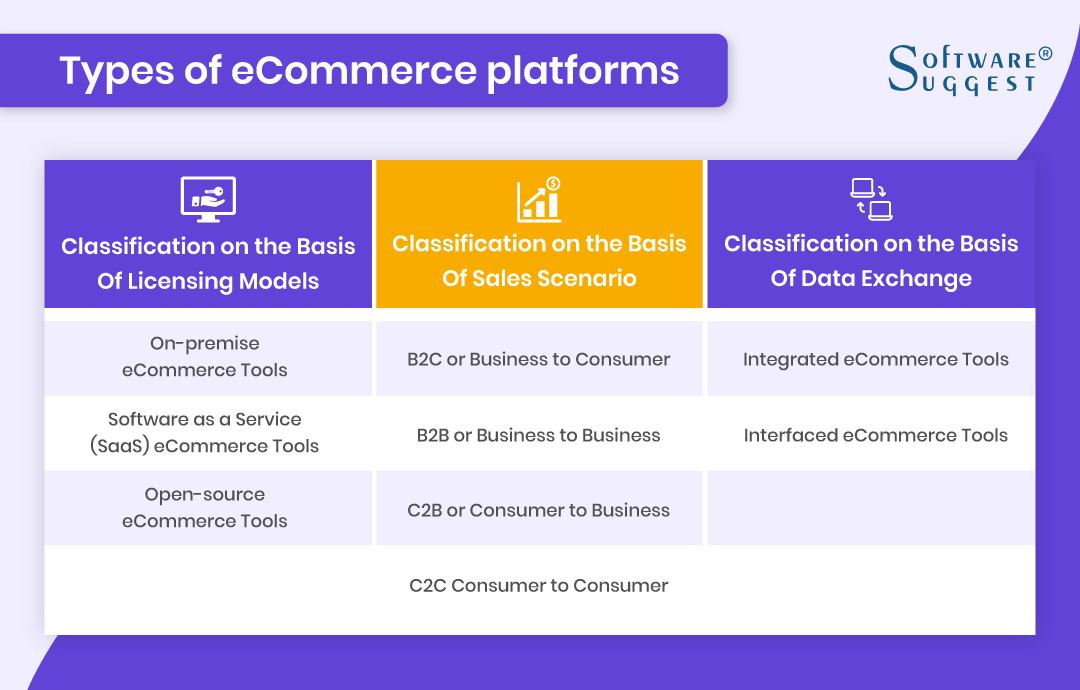
The market is flooded with different kinds of eCommerce software to cater to diverse users’ needs. One can find eCommerce solutions for small businesses as well as large businesses. Broadly, the best eCommerce platforms are categorized based on three parameters- licensing model, sales scenario, and data exchange. A better understanding of these categories will allow you to make a wise decision in choosing the right kind of eCommerce software that can address your business needs optimally. So, let’s explore the details.
A) Classification based on Licensing Models
1. On-premise eCommerce Companies
The types of eCommerce software that require the users to make a one-time investment in the initial phase are termed on-premise eCommerce companies. The investment includes hardware and software installations. Apart from that, the users have to bear the cost of software updates and support annually along with the cost of maintenance and data migration. Furthermore, one needs to have some technical knowledge to handle the software. However, the advantages of this kind of software are that they are secure, reliable, and customizable. The eCommerce platforms like Hybris, IBM WebSphere, Intershop Communications, Oorjit, and Sana Communications are a few examples of this kind of eCommerce platform. Due to investments, it is not considered as a software solution for small businesses.
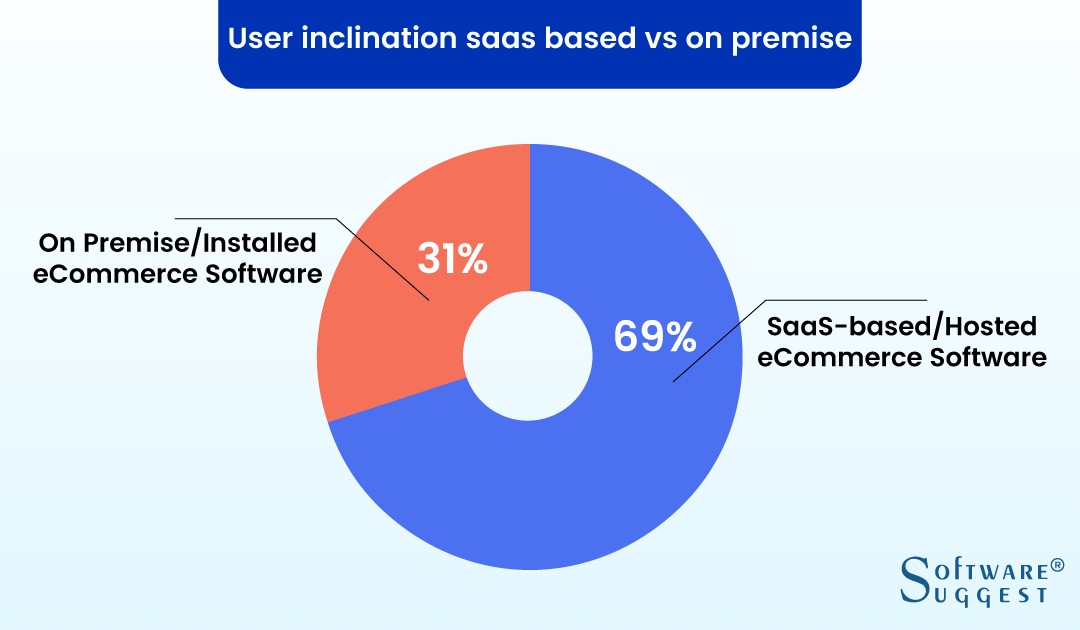
2. Software as a Service (SaaS) eCommerce
This is one of the most popular SaaS eCommerce platforms which are based on a cloud model. All the applications are managed as well as hosted in data centers. In this model, the users have to pay based on the type of subscription they opt for. This kind of eCommerce software has the edge over the on-premise eCommerce in the sense that it is affordable, easily scalable, hosted, and upgraded regularly by the service providers. However, on the downside, SaaS lacks data security and offers limited integration with the backend system which gives less control to the users. However, it can be considered among the best eCommerce software solutions for small businesses.
3. Open-source eCommerce Software Solutions
This is one of the best eCommerce software solutions for small businesses as it facilitates users with a free platform. The users need to have only basic knowledge of web design in order to install the platform. The users get the liberty to install, configure, maintain, and control the eCommerce software and they can even modify the source codes. This kind of eCommerce platform comes with a number of plugins, add-ons, and extensions, which enhance their performance. Furthermore, they are flexible and the source code is customizable. The cons are that it doesn’t offer standard integration with the backend and the cost of hosting decides its overall performance. Examples of open-source eCommerce software are Magento, PayCart, PrestaShop, and Thelia.
B) Classification based on Sales Scenario
The eCommerce solutions environment includes all kinds of sale cycles ranging from B2C (business to customer) to C2C (customer to customer). Thus, the best eCommerce platforms are designed to cater to each sale cycle. The types of eCommerce software falling in this category are:
1. B2C or Business-to-Consumer:
This is the most general kind of eCommerce ecosystem, where the businesses sell the products to the consumers for their use. The web store of these companies is open to all visitors. The users are required to log in to place the order. However, no login is required in case of a general inquiry. Since small businesses are generally involved in this type of sale involving no middleman, B2C eCommerce platforms are one of the best eCommerce solutions for small businesses.
2. B2B or Business-to-Business
In this kind of environment, one company sells its products to another company. It doesn’t include direct sales with the consumers rather it is a trade sale. Thus, such web stores can only be accessed by logging into the system. These stores offer products at wholesale rates with discounts and assortments. There are arrays of best B2B eCommerce platforms.
3. C2B or Consumer-to-Business
In this kind of eCommerce ecosystem, the customers sell their products to the companies. In this model, customers get proposals from various companies. The customers review the bids and finally choose the company that caters to their needs.
4. C2C Consumer-to-Consumer
As the name suggests, the customers trade with customers in this eCommerce environment. eBay is the best example of an eCommerce site that offers this kind of trade.
C) Classification based on Data Exchange
Every eCommerce website has chunks of data that include user data, product information, and other information about the users and products. The eCommerce stores even offer exclusive offers like discounts, cashback, and other deals for the users that differ for different user accounts. All this data is stored in the database of back-end systems like CRM (Customer relationship management) system and ERP (Enterprise resource planning) software. The information is retrieved as and when required.
There exists Business Logic that defines the way data should be created, displayed, stored, calculated, and recreated. There should be a connection between business logic and the database for better functionality. The exchange of data takes place according to the type of connection secured between the two. The data exchange for retrieval of information takes place in two types - integrated and interfaced. So, eCommerce software is either integrated or interfaced.
1. Integrated eCommerce Platforms
In this type of eCommerce platform, a connection between the database and business logic is established automatically as a result of the installation of a part of a software solution in the backend systems. The best eCommerce software should integrate with the backend system to offer more control to the users. The information that is stored in the back-end system can be reused in the front end. This kind of eCommerce software doesn’t require any investment as the business logic and database of the backend are simply re-used in the front end instead of recreating them. These kinds of eCommerce platforms are used for B2C and B2B trade. An example of an integrated eCommerce platforms is SanaCommerce.
2. Interfaced eCommerce Platforms
In this type of eCommerce platform, a connection between business logic and database is established manually as the eCommerce software is set up on the top of the backend. As a result, the information available in the backend systems is recreated or duplicated. This kind of eCommerce software has its own database and business logic which is regularly synchronized. These platforms are used in the case of B2C trade. An example of such a platform is Magento.
Which to Choose: Self-Hosted vs. Hosted eCommerce Platform Software?
To get a fair idea of the dilemma of self-hosted vs. hosted e-commerce, we will explain it in simple terms. Self-hosted e-commerce platforms provide absolute control of the customization of your business. You can set it up and run it on a shoestring budget, but it is time-consuming and has a little high maintenance.
On the contrary, hosted e-commerce platforms enable you to set up your online e-commerce business quickly as they take care of all the technical aspects of an e-store for you. But they cost more than self-hosted platforms and do not allow any personalizations of your own on your business platform.
Hence, the choice boils down to how you want to run your business: through short-term convenience (hosted) or long-term flexibility and control (self-hosted).
eCommerce Solutions can be implemented with the Following Models
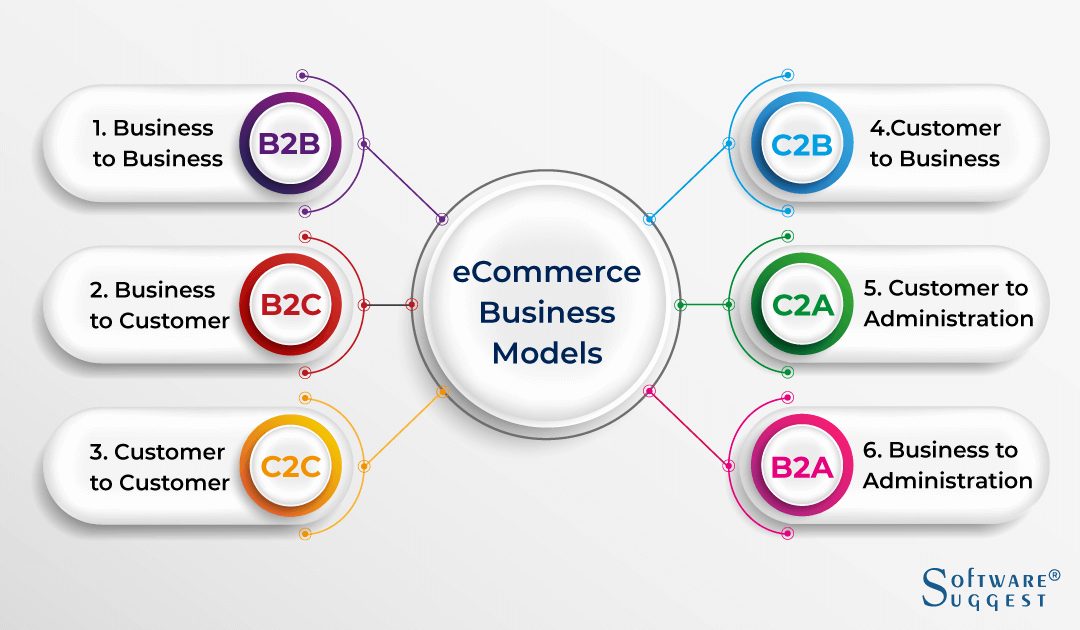
Business-to-Business (B2B): In this model, various Enterprises extend their services and products to other business entities. Eg. Web-hosting service provider.
Business-to-Customer (B2C): This is the most common type of electronic business, where a business entity provides goods and services to an end-user. It resembles the traditional retail market set up virtually over the Internet. Eg. Amazon Shopping.
Customer-to-Customer (C2C): This type of eCommerce solution involves a customer selling his services to another customer through online platforms like eBay, etc.
Customer-to-Business (C2B): When a customer provides services to a business enterprise, it is called C2B eCommerce. Freelancing is the best example of C2B where customers advertise their services and are hired by businesses to fulfill specific requirements.
Customer-to-Administration (C2A): In this model, a public organization or agency is involved in the electronic business directly with the customer.
Business-to-Administration (B2A): Here, the public administration receives services directly from Business Enterprises. Best eCommerce platforms provide business automation, online monitoring of goods and services, access to customer needs, data analytics, easy transfer of funds, and many more facilities to create an eCommerce store.
With the advent of technology, the electronic market is strengthening its grip over almost every business area, including Banking and Finance, Education, Retail eCommerce, and Wholesale Business, Manufacturing, Auctions, Entertainment, etc. Name a field and eCommerce solutions have touched it!
What are the Future of the eCommerce Industry?
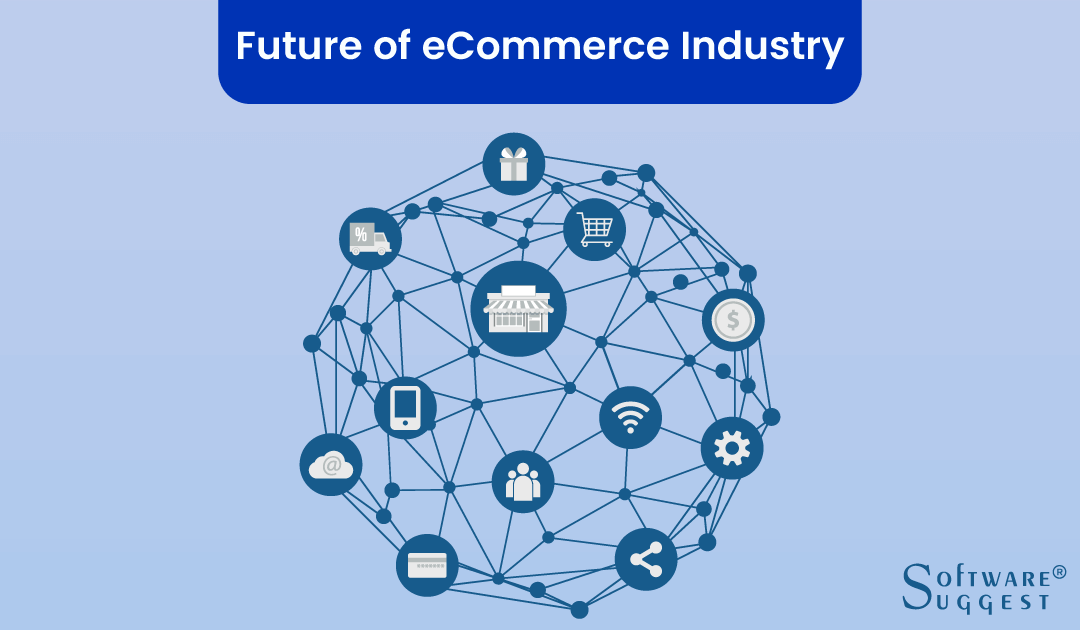
The e-commerce industry is on a boom as more and more customers from across the globe are preferring to shop online. The convenience of ordering from the comfort of the dwellings as well as hassle-free return and replacement has given the eCommerce industry an edge over traditional commerce.
From AI, and voice search to Omni-platforms, eCommerce firms are throwing in an array of features to capitalize on the market. One cannot predict the future of eCommerce software, but one thing is sure: every company will strive to enhance its services, widen its product offerings, and improve the delivery time.
Here are some latest trends in the e-commerce industry:
-
Better Personalization and User Experience
The adoption rate of eCommerce software is ever-rising and it will continue to rise in the coming years. However, modern-day customers are smart and their expectations keep on changing. So, eCommerce firms will continue to constantly upgrade their offerings to meet the needs of the customers. This is also essential to keep oneself abreast of the competition. The customers would choose those eCommerce websites that offer a shopping experience similar to that of physical stores. Thus, eCommerce retailers will adopt the best eCommerce platforms that allow the possibilities to personalize to enhance user experience.
-
Video Content
The eCommerce websites sell the products by showing pictures of the product from different angles. However, images cannot depict all the features of the products or address all the queries of the users. Thus, this led to the inception of the concept of videos. Product videos give better information about the products compared to the images and these even win the trust of the customers. The videos try to give an experience close to that of the physical stores. Thus, the companies would emphasize using video content to capitalize on the market.
-
Application of AI and Blockchain
The eCommerce industry is technology-driven. An array of top eCommerce software is already leveraging the power of chatbots to address the queries of customers 24*7 and to offer them a better customer experience. In the future, chatbots will become even smarter and these would be combined with revolutionary technologies like Blockchain to offer a fulfilling shopping experience to customers.
-
Subscription Models
Most eCommerce firms already offer the subscription model wherein the customers can subscribe to get a package consisting of daily use items delivered to them every month. In the future, more eCommerce companies will adopt this model and make it a part of their product inventory. This is also essential as every company will eye to stay ahead of its competitors and this particular model will surely help the companies in their survival.
-
Accessibility from All Devices
Customers never visit an eCommerce store from a single device. They may visit the store anytime from any device, whether a PC, laptop, mobile, or tablet. Thus, the website should be compatible with every device. An eCommerce store should be available on the web and in the form of applications. Having accessibility from every single device increases the visitors to the eCommerce store, which leads to enhanced ROI. Thus, eCommerce retailers will emphasize adopting omnichannel eCommerce software.
-
Enhanced Customer Journey with Personal Recommendations
In the race to win customers and strengthen their buying journey, the best eCommerce platforms use technologies and different algorithms to track the likes and dislikes of the users. Based on the products viewed, moved to the cart, and products ordered, each customer receives personalized recommendations from the eCommerce website. These personal recommendations enhance the customer’s experience. Thus, companies would continue to use this feature to offer personal guidance and offer more to customers.
Related Research Articles:
- 10 Game-Changing Shopify Extensions for eCommerce
- How Social Media Can Drive E-Commerce Sales?
- Laravel vs Magento: Best Framework for Ecommerce Websites
- The Benefits of an Integrated eCommerce Platform Software
- Ecommerce Website Development – Step-by-Step Guide
- Ways How Digitization Has Affected Different Sectors
- A Complete Guide to Headless eCommerce
- Predictive Analytics, How is it Beneficial in the eCommerce Retail Industry?
- Virtual Reality Is Enhancing Ecommerce Platforms
- A Guide to Finding the Best eCommerce Platforms
- B2B vs B2C eCommerce: Same But Different
- The 4 Pillars of a Successful eCommerce Website
- 15 Best Shopify Plugins For Your Ecommerce
- How to Migrate Shopify to WooCommerce? (in 8 Steps)
- Top 10 Advantages Of Ecommerce For Businesses
FAQs
Before opting for an eCommerce platform, see that it offers:
- Inventory management
- Multiple designs
- Product tracking
- Payment gateways
- Enterprise-grade features and pricing
- Integration with other tools
Before starting with eCommerce websites, you must make sure that it includes encryption methods for data transactions.
By Countries
By Cities
By Industries







